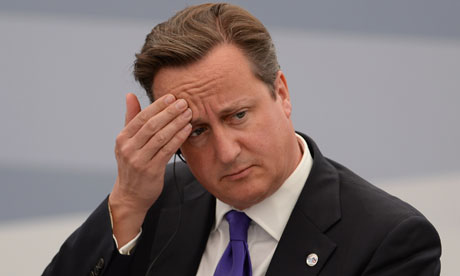G20 summit: Cameron passionate but impotent on Syria strikes
David Cameron arrived at the St Petersburg summit as the reluctant non-interventionist – paradoxically the most passionate, and the most impotent advocate for military intervention in Syria.
His very impotence, imposed on him by last week’s Commons vote, was a vivid reminder to the rest of the G20 of the worldwide public scepticism about military intervention in what many regard as a civil war.
But if Cameron felt any embarrassment that his defeat had indirectly forced Barack Obama into an extraordinary trial of strength with his own Congress, he did not show it. Throughout, the British prime minister acted as one of the most consistent advocates of military intervention at a summit supposedly about the world economy.
Cameron was determined to call others to arms, provide the evidence that Assad’s regime must have used chemical weapons, and to shake the world from its complacency about the need to do more to help on the humanitarian front.
At the four-hour dinner in the ornate splendour of Peterhof Palace on the shores of the Gulf of Finland – including a ballet and fireworks display – Cameron came up against the scale of opposition marshalled by his host.
Even before they reached the dinner, he and François Hollande, the French president, in a car with the German chancellor on their way to the summit dinner, attempted to sign up Angela Merkel, but in the midst of a general election she refused. She said the issue had to be handled through the UN.
The dinner itself had opened with strong statements in support of military intervention from America, the UK and France, but as the venison and caviar was devoured, more and more voices weighed in against. India, South Africa and Argentina said the issue had to be settled through the UN security council.
It was a position that Cameron argued, after dinner, was “a very dangerous doctrine. If you accept that, you could have a country massacring half its people, a blockage at the UN security council and no one could act.”
Cameron also made it clear that Putin had in effect closed his mind on the issue of culpability for the use of chemical weapons in the attack in Damascus on 21 August. The prime minister had come to the summit armed with fresh evidence from UK scientists at Porton Down that the deadly nerve gas sarin had been used, but this failed to persuade the Russians.
A more frustrated prime minister later described Putin’s position as untruthful: “In order to believe that the opposition was responsible, you have to construct an almost impossible case – that they used weapons they did not have, a delivery system they don’t own, that they attacked an area of which they were in control and that they then made hundreds of videos posted on to the internet.”
Cameron has a very robust and frank relationship with the Russian president, but has come to realise that Russia is simply not going to abandon Assad. With Assad stronger militarily now, the chances of Putin shifting ground seem more remote than ever.
That leaves Cameron, like the rest of the world, waiting to see whether Obama can persuade his Congress to back a war that has only limited international support.
In the meantime, Cameron will push on with trying to relieve the humanitarian crisis. At the summit he pledged further cash along with the Japanese and Canadians; at a mini-summit he urged other leaders to agree a set of principles that would allow aid workers to operate freely within Syria – including pauses in the fighting to allow aid workers to get in.
It is a worthy, indeed noble, cause to relieve the refugee’s suffering, but Cameron can hardly disguise how much he believes the “small island” he governs should be doing more. In that respect, these have been two very painful days for the prime minister.
the guardian


